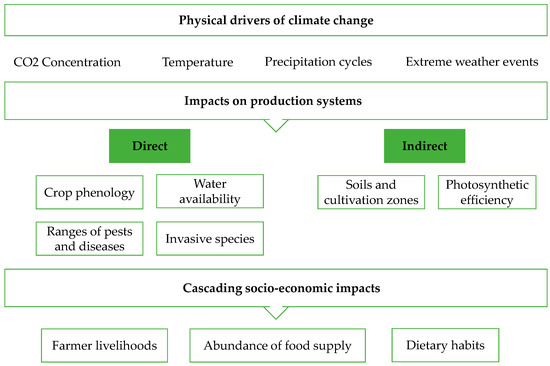Climate Change and Global Economy
A topical collection in Encyclopedia (ISSN 2673-8392). This collection belongs to the section "Social Sciences".
Viewed by 11574Editors
Interests: development economics; sustainable development; circular economy; ecological economics; political ecology; climate change; environmental studies; food security; history of economic thought; philosophy of economics
Interests: international economics; sustainable development; environmental economics; circular economy and innovation; climate change
Interests: sustainable agriculture; food security; rural sociology; climate change; migration studies; political ecology
Interests: economic activity; economic indicators; regional modelling; digital economy; digitisation; circular economy and innovation; climate change; globalisation; development economics
Topical Collection Information
Dear Colleagues,
Climate Change in its more general definition refers to a change in the state of the climate that can be identified by changes in the mean and/or variability of its properties and, that persists for extended periods of time. Climate change can be caused by natural internal processes or an external factor, such as variations in the solar cycles or, human activities that drive permanent changes in the composition of the atmosphere and, consequently, in the natural resource management. The impacts of climate change, in some cases already visible and in others foreseeable, are manifold, for example, increase in global average temperature, droughts, erosion of biodiversity, proliferations of extreme weather events, etc. All of these impacts already cause and will continue to cause negative consequences on the living conditions of humanity. One of the spheres which results to be more interrelated and connected with climate change is the economic sector: on the one hand, some of our economic activities contribute to aggravate climate change, but on the other hand, climate change affects negatively our economic activities. For instance, food production keeps an intense cause/effect relationship with climate change. Agriculture and animal breeding, especially in their industrial forms, are two of the activities that contribute the most to the greenhouse gas emissions. At the same time, these activities can be highly affected by the effects of climate change, which in many cases can be translated into the reduction of agricultural productivity, deterioration of livelihoods and drop in food security and nutrition levels. Last but not least, the far-reaching effects of climate changes on the agroecosystems are visible in the evolution of migration flows since migrations can be often an adaptation strategy to climate change that can generate both increase in livelihoods or increase in pressure on scarce natural resources, and thus, exacerbate tensions between migrants and host communities on resource rights and land tenure.
The climate change and global economy entry collection will cover the mentioned above topics and many other interesting aspects written by specialists, scientists, researchers, professionals and environmental activists.
- Climate Change and Agriculture
- Climate Change and Circular Economy
- Climate Change and Ecological Economics
- Climate Change and Migration
- Climate Change and Sustainable Development
- Climate Change and Poverty
- Climate Change and Economic Inequality
- Climate Change and Rural Communities
- Climate Change and Natural Resources
- Climate Change and Economic Growth
- Climate Change and Gender
Dr. Daniel Durán Sandoval
Prof. Dr. Gemma Durán Romero
Dr. Francesca Uleri
Dr. Ana M. López
Collection Editors
Manuscript Submission Information
Manuscripts should be submitted online at www.mdpi.com by registering and logging in to this website. Once you are registered, click here to go to the submission form. Manuscripts can be submitted until the deadline. All submissions that pass pre-check are peer-reviewed. Accepted papers will be published continuously in the journal (as soon as accepted) and will be listed together on the collection website. Research articles, review articles as well as short communications are invited. For planned papers, a title and short abstract (about 100 words) can be sent to the Editorial Office for announcement on this website.
Submitted manuscripts should not have been published previously, nor be under consideration for publication elsewhere (except conference proceedings papers). All manuscripts are thoroughly refereed through a single-blind peer-review process. A guide for authors and other relevant information for submission of manuscripts is available on the Instructions for Authors page. Encyclopedia is an international peer-reviewed open access quarterly journal published by MDPI.
Please visit the Instructions for Authors page before submitting a manuscript. The Article Processing Charge (APC) for publication in this open access journal is 1000 CHF (Swiss Francs). Submitted papers should be well formatted and use good English. Authors may use MDPI's English editing service prior to publication or during author revisions.
Keywords
- climate change
- ecological economics
- global economy
- environmental economics
- natural resources







